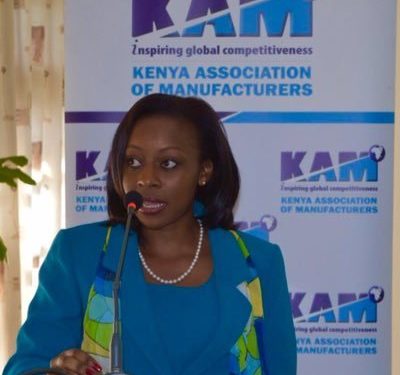Kenya Association of Manufacturers (KAM) has spelt out interventions measures that are needed to aid the country’s economic and manufacturing sector’s recovery from the impact of COVID-19 as businesses navigate challenges caused by shocks arising from the virus.
KAM has developed a Manufacturing Resilience and Sustainability Policy Toolkit in conjunction with KPMG.
Policies developed to drive economic resilience and sustainability should target four areas, according to KMA. This includes continuously addressing the health emergency, supporting liquidity of businesses, maintaining links between employers and employees and rethinking the current economic model with a view of aligning it to the new world the pandemic is creating.
Speaking during the launch of the Policy Toolkit last week, the Chief Administrative Secretary (CAS) for Industrialization, Trade and Enterprise Development, Mr Lawrence Karanja noted the importance of strengthening our value chains.
“COVID-19 has exposed the dangers of over-reliance on imports. We had to develop our own solutions locally in efforts towards mitigating the impact of the virus. To meet the demand for essential items, local industries had to fill in supply chain gaps and produce hand sanitizers, masks and personal protective equipment. This demonstrated our industrial capacity as a country,” said Mr Karanja.
He added that the government has identified sectors with high potential to boost the country’s economic recovery, noting that, “To ensure we build the resilience of the local manufacturing sector, we have identified opportunities for investment and value addition, from shocks arising from COVID-19. For example, new technology development, collaboration with biotech firms to enhance our pharmaceutical sector, Agro-processing as well as Textile and Apparel.”
KAM Chairman, Mr Mucai Kunyiha noted that initially, the policy responses by countries across the globe were nearly identical and mainly involved expansionary fiscal and monetary policies and premised on the assumption that COVID-19 pandemic will be contained in a few months.
“The reality is different. The pandemic is shaping what is our new normal. As such, the post-COVID future must be informed by this reality. This calls for policymakers to pause and take stock of what it will take to assure a robust recovery”, said Mr Kunyiha.
He also added that the crisis presents an opportunity for the government and businesses, noting, “For government, it is an opportunity to rethink the current economic model to align it to the “new world” that the pandemic is creating. In particular, the need to diversify the economy and exploit emerging opportunities such as component manufacturing, development of agro-industry value chains and shortening of supply-chains. On the other hand, businesses must retool and reconfigure business models based on the emerging realities and they will require government support.”
KPMG CEO and Senior Partner, Benson Ndung’u observed that the manufacturing sector has been on a declining trend since 2012, in terms of its contribution to the Gross Domestic Product (GDP).
“Before the outbreak of COVID-19, local industry was facing challenges, which we must acknowledge. To attain our goal of 15% contribution to the GDP, we need to put in place measures that drive its growth, for job and wealth creation. The current crisis presents an opportunity for all stakeholders to develop new strategies and develop measures that work, with or without a crisis to prevent us from suffering shocks in future,” remarked Mr Ndungu.
The National Treasury and Planning PS, Julius Muia, said that they are working on a long-term development framework.
“Through the development framework, we hope to grow Kenya into an export-led economy. This will ensure that we are self-reliant as a country, exploit and the use of local content as much as possible to boost productivity and reduce over-reliance on imports,” noted PS Muia.
The Policy Toolkit shall aid in charting forward the growth, development, and resilience of the manufacturing sector to attain the 15% contribution to Kenya’s Gross Domestic Product (GDP) as envisioned in the Big Four Agenda.





